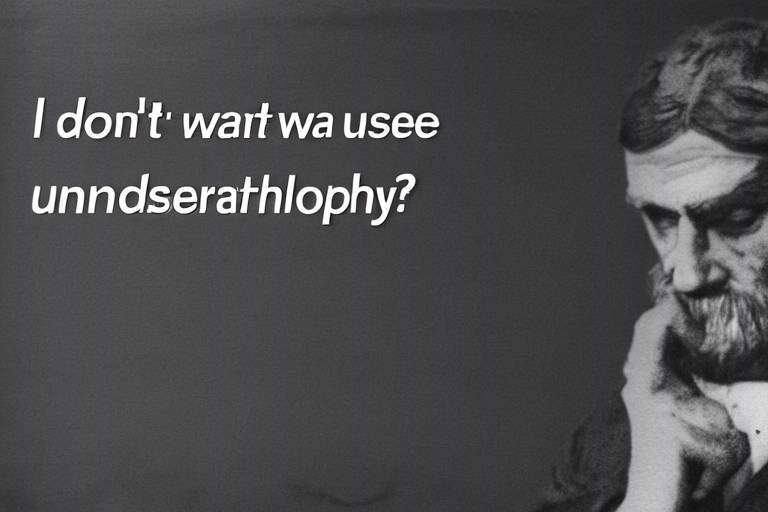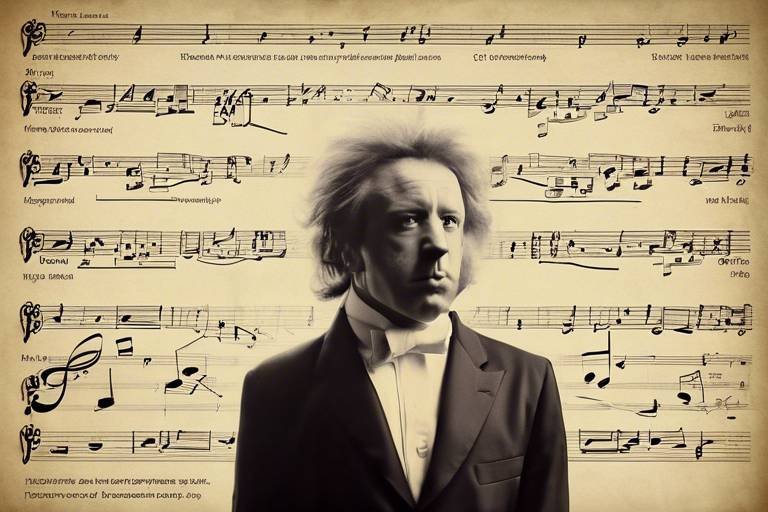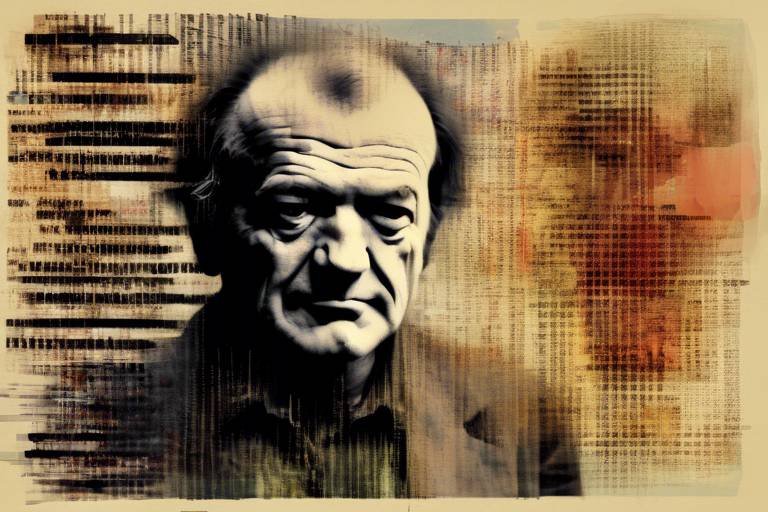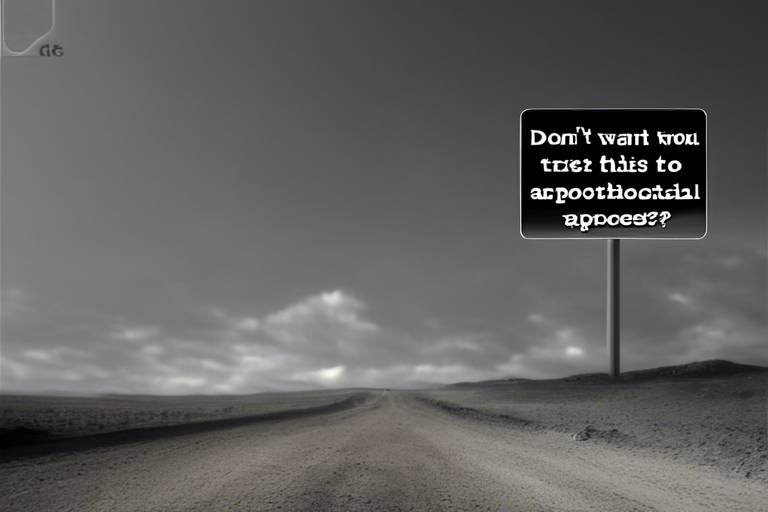Deconstructing the Philosophical Approach Towards Love
Love is a concept that has captivated human thought for centuries, weaving its way through the fabric of our lives and influencing our relationships, art, and even our philosophies. When we think about love, we often picture the butterflies in our stomachs or the warmth of a hug. But what if I told you that love is also a profound philosophical inquiry? In this exploration, we will dive into various philosophical perspectives on love, examining how different thinkers have interpreted its nature, significance, and impact on human relationships throughout history. From ancient Greece to modern existentialism, the journey through love's philosophical landscape is as complex as love itself.
At its core, love is elusive, often described as a feeling, an action, or even a state of being. Philosophers have long debated its essence, leading to a rich tapestry of definitions and types. Is love merely a biochemical reaction, or does it transcend the physical realm? Some argue that love encompasses various forms, including romantic love, platonic love, and self-love, each serving a unique purpose in our lives. This multifaceted nature of love invites us to ask deeper questions: What is the true purpose of love? Is it simply to connect with others, or does it serve as a mirror reflecting our innermost selves?
Throughout history, love has been perceived in myriad ways, shaped by cultural contexts and the prevailing philosophies of the time. Ancient philosophers like Plato and Aristotle laid the groundwork for understanding love, while later movements like Romanticism brought emotional depth to the forefront. Each era has contributed to a broader understanding of love, showcasing its evolution. For instance, during the Romantic period, poets and thinkers emphasized the individual experience of love, portraying it as a sublime force that transcends the mundane. This historical journey reveals how love is not just a personal experience but a collective cultural phenomenon.
One of the most influential thinkers on love is Plato, who explored this theme extensively in his work The Symposium. In this dialogue, Plato presents love as a pursuit of beauty and truth, suggesting that love is not merely about physical attraction but rather a journey towards higher understanding. He posits that love can elevate the soul, guiding individuals from the tangible to the intangible, from the physical to the intellectual. This perspective has profoundly influenced Western thought on romantic relationships, encouraging us to seek deeper connections beyond mere attraction.
One of the most enduring concepts that emerged from Plato's philosophy is Platonic love. This form of love emphasizes a non-sexual connection that fosters deep, meaningful relationships without the need for physical intimacy. It champions the idea that emotional and intellectual bonds can be just as fulfilling, if not more so, than romantic or sexual relationships. In a world often focused on physicality, Platonic love serves as a reminder that profound connections can exist on a purely emotional or intellectual level, enriching our lives in unique ways.
Another fascinating metaphor that Plato employs is the idea of love as a ladder. This metaphor illustrates the ascent from physical attraction to the appreciation of higher forms of beauty and knowledge. Imagine climbing a ladder where each rung represents a deeper understanding of love. The first rung might be the attraction to physical beauty, while the higher rungs lead to the appreciation of virtues like kindness, wisdom, and ultimately, the love of truth itself. This ascent is not just a philosophical concept; it encourages us to look beyond the surface and seek deeper connections with ourselves and others.
The Romantic era marked a significant shift in the perception of love, as poets and thinkers began to emphasize emotional depth and individual experience. Love was no longer just a societal obligation or a means of procreation; it became a sublime force that could inspire creativity and transcendence. Romantic poets like Wordsworth and Keats celebrated love as a powerful emotion that connects us to nature and the universe. Their works invite us to explore the depths of our feelings and recognize love as a transformative experience that can lead to personal growth and understanding.
Fast forward to contemporary times, and the philosophical discussions around love have only grown more complex. Today, we see existential and feminist perspectives challenging traditional notions of love. Existentialist philosophers like Jean-Paul Sartre and Simone de Beauvoir argue that love is intertwined with self-discovery and authenticity. They highlight the tension between freedom and connection, suggesting that true love requires acknowledging both our individuality and our bonds with others. This modern lens encourages us to rethink our relationships and consider how they shape our identities.
For existentialists, love is not just a feeling; it is a means of self-discovery. Sartre famously stated, "Hell is other people," reflecting the tension between personal freedom and the need for connection. In this view, love becomes a complex dance where we navigate our desires for autonomy while also seeking intimacy. This perspective challenges us to consider how our relationships reflect our values and how they contribute to our understanding of ourselves.
Feminist critiques of traditional love narratives have opened new avenues for understanding love's complexities. By addressing issues of power dynamics, autonomy, and societal constructs, feminist thinkers encourage us to question the norms that govern our romantic relationships. They ask us to consider how love can sometimes perpetuate inequality and how we can strive for more equitable partnerships. This perspective empowers individuals to seek love that honors both partners' autonomy and desires, fostering healthier and more fulfilling relationships.
- What is the philosophical definition of love? Philosophically, love is often viewed as a complex emotion that encompasses various forms of connection, including romantic, platonic, and self-love.
- How did Plato influence the understanding of love? Plato's works, particularly The Symposium, introduced the idea of love as a pursuit of beauty and truth, influencing Western thought on romantic relationships.
- What is Platonic love? Platonic love refers to a deep emotional connection that does not involve physical intimacy, emphasizing the importance of intellectual and emotional bonds.
- How do modern philosophies view love? Modern philosophies, including existentialism and feminism, challenge traditional notions of love by exploring themes of self-discovery, autonomy, and power dynamics in relationships.

The Nature of Love
Love is often described as one of the most profound emotions humans can experience, yet it remains a complex and elusive concept. Philosophers, poets, and everyday people alike have grappled with its meaning for centuries. What is love, really? Is it merely an emotion, or does it transcend into something more significant? To answer these questions, we must first explore the essence of love and its various forms.
At its core, love can be categorized into several types, each with its own unique characteristics and implications. For instance, we have romantic love, which is often characterized by passion and desire, and platonic love, which emphasizes deep connections without sexual attraction. Then there's familial love, the bond shared among family members, and self-love, which is crucial for personal well-being and self-acceptance. These distinctions raise intriguing questions about the nature of love: Is one type more valuable than another? Does love change over time?
Philosophical inquiries into love often lead us to consider its purpose in our lives. Some thinkers argue that love serves as a fundamental driving force behind human relationships, fostering connections that enhance our existence. Others suggest that love may be a mere biological impulse designed to ensure the survival of our species. This dichotomy presents a fascinating tension: Are we driven by instinct, or is love a higher calling that elevates our human experience?
Moreover, love’s impact on our lives can be both transformative and destructive. It can inspire us to achieve greatness, push us to become better versions of ourselves, and create bonds that withstand the test of time. Conversely, love can also lead to heartache and suffering, raising the question of whether the pain of love is worth the joy it brings. This paradox reflects the duality of love, which can be as uplifting as it is challenging.
To further explore the nature of love, let's consider a few key philosophical perspectives:
- Aristotle: He believed that love, particularly friendship, is essential for a fulfilling life, emphasizing the importance of mutual respect and virtue.
- Kant: He viewed love as a moral obligation, suggesting that true love must be grounded in respect for the other person as an end in themselves, not merely as a means to an end.
- Nietzsche: He took a more critical stance, arguing that love can often be a source of weakness and dependency, challenging us to embrace a more individualistic approach to relationships.
In summary, the nature of love is multifaceted and deeply intertwined with our experiences, beliefs, and values. It invites us to explore not just our feelings, but also the very essence of what it means to connect with others. As we continue to navigate our relationships, we may find that love is not just an emotion to be felt but a journey to be experienced, filled with lessons that shape our understanding of ourselves and the world around us.
- What are the different types of love? Love can be categorized into romantic, platonic, familial, and self-love, each serving different roles in our lives.
- Is love purely an emotion? While love is an emotion, it also encompasses deeper connections and commitments that go beyond mere feelings.
- Can love be both positive and negative? Yes, love can bring immense joy but also pain, highlighting its complex nature.

Historical Perspectives on Love
Throughout history, love has been a subject of profound interest and debate among philosophers, poets, and thinkers. Each era has brought its own unique lens through which to view this complex emotion. From the ancient Greeks to the modern day, the understanding of love has evolved, reflecting cultural, social, and philosophical shifts. It is fascinating to see how love, in its many forms, has been interpreted and reinterpreted across different times and places.
In ancient Greece, love was often categorized into distinct types, each with its own characteristics and significance. The Greeks had several words for love, including eros (romantic love), philia (brotherly love), and agape (unconditional love). These distinctions helped shape their understanding of relationships and emotional bonds. Philosophers like Plato and Aristotle explored these concepts in depth, laying the groundwork for future discussions on love.
Moving into the Middle Ages, love took on a more spiritual dimension, heavily influenced by religious teachings. The concept of courtly love emerged during this time, where love was often idealized and placed on a pedestal. This form of love was characterized by its unattainability and often existed outside of marriage, reflecting societal norms that valued chivalry and devotion. Notable poets like Dante and Petrarch exemplified this ideal in their works, portraying love as a divine force that could elevate the soul.
As we transition into the Renaissance, love began to be viewed through a more humanistic lens. The focus shifted from the divine to the individual, emphasizing personal experience and emotional depth. Thinkers such as Shakespeare captured the intricacies of romantic love, showcasing its joys and sorrows in a way that resonated with the human experience. This era marked a significant shift in how love was perceived, moving towards a more nuanced understanding that acknowledged both its beauty and its challenges.
The Enlightenment brought about another transformation in the discourse on love. Philosophers like Kant and Rousseau delved into the moral and ethical implications of love, questioning its role in society and individual autonomy. Love was seen not just as an emotion but as a social contract that could either liberate or constrain individuals. This period laid the groundwork for modern discussions about love's complexities and its impact on human relationships.
In the 19th century, the Romantic movement further revolutionized the concept of love. Poets and writers emphasized the emotional and passionate aspects of love, often portraying it as a force of nature that transcended societal norms. The idea of love as a source of inspiration and creativity became prevalent, influencing art and literature in profound ways. This period also saw the emergence of feminist thinkers who began to critique traditional notions of love, arguing for a more equitable understanding of relationships.
As we enter the 20th and 21st centuries, love continues to be a rich field of inquiry. Modern philosophers explore love through various lenses, including existentialism, which views love as a means of self-discovery and authenticity. Thinkers like Jean-Paul Sartre and Simone de Beauvoir examined the tension between freedom and connection, questioning how love can both liberate and bind individuals. Additionally, feminist perspectives have emerged, challenging traditional narratives and addressing issues of power dynamics and autonomy within romantic relationships.
In summary, the historical perspectives on love reveal a tapestry of ideas that have shaped our understanding of this fundamental human experience. From ancient Greece to contemporary discussions, love remains a dynamic and evolving concept, reflecting the complexities of human relationships and the societal contexts in which they exist.
- What are the different types of love? Love can be categorized into various types, including romantic love (eros), brotherly love (philia), and unconditional love (agape).
- How did the perception of love change during the Renaissance? The Renaissance shifted the focus from divine love to individual experience, emphasizing emotional depth and personal connections.
- What role did feminism play in the discourse on love? Feminist thinkers critiqued traditional love narratives, addressing issues of power dynamics and advocating for more equitable relationships.

Plato's Concept of Love
When we dive into the philosophical waters of love, one name that often surfaces is Plato. His thoughts, particularly articulated in his dialogue The Symposium, paint a vivid picture of love as a profound pursuit. For Plato, love is not merely a fleeting emotion; it is a journey toward something much greater. Imagine love as a magnificent staircase, where each step represents a deeper understanding of beauty and truth. This metaphor illustrates how love can elevate our souls and lead us to a higher existence.
In The Symposium, various characters present their views on love, culminating in a rich tapestry of ideas. Plato suggests that love begins with physical attraction—a spark that ignites our interest in another person. However, as we ascend this metaphorical ladder, we start to appreciate not just the physical form but also the beauty of the mind and spirit. This journey from the physical to the intellectual and ultimately to the divine is what makes love so transformative.
One of the key concepts that emerge from Plato's exploration of love is Platonic love. Contrary to what the term might suggest today, Platonic love does not imply a romantic connection devoid of passion. Instead, it refers to a deep, meaningful bond that transcends physical desire. Think of it as a friendship that is profoundly enriching, where both individuals inspire each other to grow intellectually and spiritually. This type of love is celebrated for its purity; it’s about connecting on a level that goes beyond mere attraction.
To further understand Plato's concept of love, let's break it down into a few essential components:
- Physical Attraction: The initial spark that draws individuals together.
- Intellectual Connection: The appreciation of each other's thoughts and ideas.
- Spiritual Bond: The ultimate pursuit of wisdom and truth that transcends the physical realm.
This philosophical journey reflects the belief that love is a catalyst for personal growth. By engaging in relationships that challenge us, we can elevate our understanding of ourselves and the world around us. In this light, love becomes a powerful force that shapes our identities and our destinies.
In essence, Plato's concept of love encourages us to look beyond the surface. It invites us to explore the depths of our connections with others, urging us to seek beauty in its many forms. Love, according to Plato, is not just about the *who* but the *why* and *how*, making it a central theme in the quest for knowledge and fulfillment in our lives.

The Symposium,
This article explores various philosophical perspectives on love, examining how different thinkers have interpreted its nature, significance, and impact on human relationships throughout history.
This section delves into the essence of love, discussing its definitions, types, and the philosophical inquiries surrounding its true nature and purpose in human life.
An overview of how love has been perceived throughout different eras, highlighting key philosophers and their contributions to the understanding of love in various cultural contexts.
Exploring Plato's ideas on love, particularly in The Symposium, where he presents love as a pursuit of beauty and truth, influencing Western thought on romantic relationships.
A discussion on the concept of Platonic love, emphasizing its non-sexual nature and its relevance in forming deep, meaningful connections without physical intimacy.
Examining the metaphor of love as a ladder in Plato's philosophy, illustrating the ascent from physical attraction to the appreciation of higher forms of beauty and knowledge.
Analyzing the Romantic era's impact on the concept of love, focusing on how poets and thinkers emphasized emotional depth, individual experience, and the sublime nature of love.
This section investigates contemporary philosophical discussions on love, including existential and feminist perspectives that challenge traditional notions and explore love's complexities in modern society.
Understanding how existentialist philosophers like Sartre and de Beauvoir view love as a means of self-discovery and authenticity, highlighting the tension between freedom and connection.
Exploring feminist critiques of traditional love narratives, this section addresses issues of power dynamics, autonomy, and the social constructs surrounding romantic relationships.
In The Symposium, Plato presents a series of speeches by various characters, each exploring the nature of love from different angles. This dialogue is not just a philosophical treatise but a rich tapestry of ideas that reflect the complexities of love. The characters, including Socrates, Aristophanes, and Agathon, contribute their unique perspectives, weaving a narrative that elevates love from mere physical attraction to a profound pursuit of the divine.
One of the most striking aspects of The Symposium is the way it illustrates love as a ladder of ascent. This metaphor suggests that love begins with physical attraction, but the true goal is to ascend toward a higher understanding of beauty and goodness. It's akin to climbing a mountain; while the base may be enticing, the summit offers a breathtaking view that transcends the initial allure. This ascent is not just about romantic love but encompasses all forms of love, including love for friends, family, and even the love of wisdom itself.
Furthermore, the dialogue emphasizes that love is inherently linked to the pursuit of truth. Each speaker, in their own way, suggests that genuine love compels individuals to seek a deeper understanding of themselves and the world around them. As Socrates famously states, love is a desire for the eternal possession of the good, which pushes us to grow and evolve. This idea resonates with many modern interpretations of love, where emotional growth and self-discovery are seen as vital components of any meaningful relationship.
In conclusion, The Symposium serves as a foundational text in understanding love, illustrating that it is not merely an emotion but a driving force that shapes our existence. Its exploration of love as a journey—one that encourages us to reach for higher ideals—continues to inspire and challenge our perceptions of what it means to love and be loved.
- What is the main idea of Plato's Symposium?
The main idea centers around the nature of love, exploring its different forms and its significance in human relationships. - How does Plato define love?
Plato defines love as a pursuit of beauty and truth, emphasizing its role in personal and philosophical growth. - What is Platonic love?
Platonic love refers to a deep, non-sexual connection between individuals, focusing on emotional and intellectual intimacy. - Why is love compared to a ladder in Plato's philosophy?
The ladder metaphor illustrates the progression from physical attraction to a higher appreciation of beauty and knowledge.

where he presents love as a pursuit of beauty and truth, influencing Western thought on romantic relationships.
This article explores various philosophical perspectives on love, examining how different thinkers have interpreted its nature, significance, and impact on human relationships throughout history.
This section delves into the essence of love, discussing its definitions, types, and the philosophical inquiries surrounding its true nature and purpose in human life.
An overview of how love has been perceived throughout different eras, highlighting key philosophers and their contributions to the understanding of love in various cultural contexts.
In his profound work, The Symposium, Plato presents love as a pursuit of beauty and truth, a concept that has significantly influenced Western thought on romantic relationships. He suggests that love is not merely a fleeting emotion or a physical attraction but rather an essential drive that compels individuals to seek out beauty in its many forms. This pursuit is not limited to the physical realm; instead, it transcends to a deeper understanding of beauty that encompasses the mind and soul. Plato's portrayal of love invites us to consider how our connections with others can lead us to higher truths and a more profound appreciation of existence.
A discussion on the concept of Platonic love emphasizes its non-sexual nature and its relevance in forming deep, meaningful connections without physical intimacy. This notion encourages relationships that are based on mutual respect, admiration, and intellectual engagement. In a world where physical attraction often overshadows emotional connection, Platonic love serves as a reminder that the essence of love can thrive in the absence of physical desire.
Examining the metaphor of love as a ladder in Plato's philosophy illustrates the ascent from physical attraction to the appreciation of higher forms of beauty and knowledge. This metaphor suggests that as individuals climb this ladder, they move from the lower, more superficial levels of love to the higher, more profound forms that ultimately lead to the love of truth and wisdom. This journey is not just about romantic relationships; it can apply to all forms of love, urging us to seek deeper connections and understanding.
Analyzing the Romantic era's impact on the concept of love, focusing on how poets and thinkers emphasized emotional depth, individual experience, and the sublime nature of love.
This section investigates contemporary philosophical discussions on love, including existential and feminist perspectives that challenge traditional notions and explore love's complexities in modern society.
Understanding how existentialist philosophers like Sartre and de Beauvoir view love as a means of self-discovery and authenticity, highlighting the tension between freedom and connection.
Exploring feminist critiques of traditional love narratives, this section addresses issues of power dynamics, autonomy, and the social constructs surrounding romantic relationships.
- What is the essence of love according to Plato?
Plato views love as a pursuit of beauty and truth, encouraging individuals to seek deeper connections beyond mere physical attraction. - How does Platonic love differ from romantic love?
Platonic love emphasizes emotional and intellectual connections without the need for physical intimacy, fostering deep, meaningful relationships. - What metaphor does Plato use to describe love?
Plato uses the metaphor of a ladder, illustrating the progression from physical attraction to higher forms of beauty and knowledge. - How did Romanticism change the perception of love?
The Romantic era emphasized emotional depth and individual experience, highlighting the sublime and transformative aspects of love.

Platonic Love
When we hear the term , it often conjures images of deep, meaningful friendships that transcend the physical realm. But what does it really mean? Originating from the ideas of the ancient Greek philosopher Plato, this concept emphasizes a profound emotional connection that exists without the allure of sexual attraction. Imagine a bond so strong that it defies the conventional boundaries of romance; that's the essence of Platonic love.
In Plato's dialogue, The Symposium, he presents a compelling argument that love is not merely about physical attraction but rather a pursuit of the higher forms of beauty and truth. This philosophical viewpoint encourages individuals to seek connections that nourish the soul, fostering intellectual and emotional growth. In a world often obsessed with physicality, Platonic love serves as a refreshing reminder that the heart can connect deeply without the need for physical intimacy.
One might wonder, how does this type of love manifest in real life? It often appears in friendships where both parties share their thoughts, dreams, and vulnerabilities without the complications that romantic relationships can introduce. Think about your closest friends—those who know your quirks, support your ambitions, and stand by you during life's ups and downs. This is the beauty of Platonic love: it's a sanctuary where individuals can be their true selves, free from judgment and expectation.
Moreover, Platonic love can be incredibly enriching. It allows for the exploration of emotional intimacy without the pressures of romantic entanglements. In many ways, it mirrors the relationship between a mentor and a mentee, where wisdom and guidance flow freely, creating a bond that is both nurturing and enlightening. This type of connection can often lead to profound insights about oneself and others, showcasing the transformative power of love in its purest form.
Interestingly, Platonic love also raises questions about the nature of relationships in our modern society. With the rise of dating apps and the casual nature of contemporary romance, one might argue that the depth of connections is often sacrificed for fleeting encounters. In contrast, Platonic love invites us to explore the richness of human connection, urging us to invest time and energy into relationships that foster growth and understanding.
To illustrate the contrast between Platonic love and romantic love, consider the following table:
| Aspect | Platonic Love | Romantic Love |
|---|---|---|
| Physical Attraction | No | Yes |
| Emotional Intimacy | High | Varies |
| Commitment | Optional | Often expected |
| Purpose | Personal growth and understanding | Romantic fulfillment |
In conclusion, Platonic love is a powerful and often overlooked aspect of human relationships. It challenges us to redefine our understanding of love, encouraging us to cultivate connections that are deeply rooted in respect, admiration, and emotional support. So, the next time you think about love, remember that it doesn't always have to come wrapped in romance; sometimes, the most profound connections are those that simply allow us to be ourselves.
- What is Platonic love? Platonic love refers to deep, non-sexual friendships that prioritize emotional and intellectual connection over physical attraction.
- Can Platonic love exist between genders? Absolutely! Platonic love can flourish between individuals of any gender, emphasizing the strength of emotional bonds irrespective of societal norms.
- How does Platonic love differ from romantic love? While romantic love often involves physical attraction and expectations of commitment, Platonic love focuses on emotional intimacy and personal growth without sexual involvement.

Love as a Ladder
In the realm of philosophical thought, Plato's metaphor of love as a ladder is particularly captivating. Imagine standing at the base of a tall ladder, where each rung represents a different level of love and understanding. At the bottom, we find physical attraction, a primal instinct that draws us to one another. It’s the spark that ignites our interest, but it’s just the beginning. As we ascend each rung, we begin to appreciate more profound aspects of love—emotional connections, intellectual companionship, and ultimately, a love that transcends mere physicality.
This ascent isn’t merely about moving up; it’s about transformation. Each step brings a deeper understanding of what it means to love and be loved. For instance, the second rung might represent emotional intimacy, where partners share their fears, dreams, and vulnerabilities. It’s a space where we start to feel truly seen and heard. The third rung could symbolize intellectual companionship, where conversations flow effortlessly, and ideas spark inspiration. Here, love becomes a dance of minds, an exchange of thoughts that enriches both partners.
At the pinnacle of this ladder lies the appreciation of higher forms of beauty—an almost spiritual connection that goes beyond the physical and emotional. This is where love becomes a pursuit of truth, a journey that invites us to explore not only our partner but also ourselves. It’s in this space that we find a love that is not possessive or conditional but rather liberating and expansive. Love, in this sense, becomes a means of personal growth and enlightenment.
What’s fascinating is that this ladder is not static; it can be climbed and descended at different times in a relationship. There are moments when partners may find themselves at different rungs, experiencing love in diverse ways. For example, during challenging times, one may cling to the physical aspect of love for comfort, while the other longs for deeper emotional or intellectual engagement. This fluctuation is natural and highlights the dynamic nature of love.
Ultimately, the metaphor of love as a ladder serves as a reminder that love is a journey, not a destination. Each rung we climb offers new insights and experiences that enrich our lives. It encourages us to strive for a love that is not just about passion but also about understanding, growth, and the pursuit of beauty in all its forms.
- What does it mean to love someone at a higher rung of the ladder?
To love someone at a higher rung means to appreciate deeper emotional and intellectual connections, moving beyond just physical attraction. - Can relationships fluctuate between different rungs of love?
Yes, relationships can fluctuate as partners may experience different levels of intimacy and connection at various times. - Is the ladder metaphor applicable to all types of love?
While primarily used in romantic contexts, the ladder metaphor can apply to platonic and familial love, emphasizing growth and understanding.

Romanticism and Love
The Romantic era, spanning from the late 18th to the mid-19th century, marked a significant shift in how love was perceived and expressed in literature, art, and philosophy. This period was characterized by a profound emphasis on **individual emotion** and the **sublime** nature of love, contrasting sharply with the rationalism of the Enlightenment. Thinkers and poets of this time believed that love was not merely a social contract or a means to an end, but rather a **transformative experience** that could elevate the human spirit and connect individuals on a deeply emotional level.
One of the defining features of Romanticism was its focus on **personal experience** and the idea that love transcends societal norms and expectations. Poets like **William Wordsworth**, **Lord Byron**, and **John Keats** celebrated love as a powerful force that could inspire creativity and lead to profound self-discovery. They often portrayed love as a **mystical journey**, where the beloved becomes a muse, igniting the flames of passion and artistic expression. In this sense, love was seen as a pathway to understanding oneself and the world around us.
Romantic thinkers also emphasized the **contrast between idealized love and the harsh realities of life**. While they often painted love in the most beautiful and poetic terms, they did not shy away from acknowledging its complexities and challenges. The tension between the ideal and the real is beautifully captured in the works of poets like **Elizabeth Barrett Browning**, who explored the depths of love in her sonnets, revealing both the joy and pain that can accompany deep emotional connections.
Moreover, the Romantic era introduced the idea of **unrequited love** as a poignant theme, showcasing the struggles and heartaches that often accompany passionate feelings. This notion resonated with many, as it reflected the **human condition**—the longing for connection and the pain of separation. The portrayal of love as both a blissful and tormenting experience added layers of complexity to the understanding of romantic relationships, making it a rich subject for exploration in art and literature.
To further illustrate the impact of Romanticism on the concept of love, consider the following table that highlights some key figures and their contributions:
| Poet/Philosopher | Key Contributions |
|---|---|
| William Wordsworth | Emphasized nature and emotional depth in love, portraying it as a **natural** and **spiritual** experience. |
| Lord Byron | Explored themes of **heroic love** and **individualism**, often depicting love as a passionate struggle. |
| John Keats | Celebrated beauty and the transient nature of love, focusing on the **sensory experiences** associated with romantic feelings. |
| Elizabeth Barrett Browning | Delved into the complexities of love, revealing its duality of joy and sorrow through her sonnets. |
In conclusion, the Romantic era profoundly reshaped the discourse around love, moving it from a mere social obligation to a **sacred experience** that encompasses both ecstasy and agony. Love, during this period, was not just a feeling; it was a **philosophical inquiry** into the very essence of human existence. This era laid the groundwork for modern understandings of love, emphasizing that it is a complex interplay of emotions, experiences, and personal growth.
- What is the main focus of Romanticism in relation to love?
The main focus of Romanticism in relation to love is the emphasis on individual emotion, personal experience, and the transformative power of love, contrasting with the rationalism of earlier philosophical thought. - How did Romantic poets view unrequited love?
Romantic poets often portrayed unrequited love as a poignant theme, reflecting the struggles and heartaches that accompany passionate feelings, highlighting the longing for connection. - Who are some key figures in Romantic literature that explored love?
Key figures include William Wordsworth, Lord Byron, John Keats, and Elizabeth Barrett Browning, each contributing unique perspectives on the nature of love.

Modern Philosophical Views on Love
In the ever-evolving landscape of human relationships, the have brought forth a rich tapestry of ideas that challenge traditional notions and explore the intricate complexities of love in today’s society. Philosophers are no longer just pondering over the romantic ideals of the past; instead, they are diving deep into the nuances that define love in a world marked by rapid social changes, technological advancements, and shifting cultural norms. So, what does love mean in our contemporary context? How do we navigate the tangled web of emotions, desires, and connections?
One significant area of exploration is the perspective of existentialism, which emphasizes the individual's experience and the quest for authenticity in relationships. Thinkers like Jean-Paul Sartre and Simone de Beauvoir have articulated love as a profound journey of self-discovery. For them, love is not merely a romantic entanglement but a means to explore one's own identity and existence. Sartre, for instance, famously stated that "Hell is other people," suggesting that our relationships can be sources of both liberation and entrapment. This duality creates a fascinating tension: while love can provide connection and meaning, it can also challenge our freedom and individuality.
Moreover, existentialists argue that in love, we confront the paradox of seeking connection while striving for personal autonomy. This leads to a deeper understanding of love as a dynamic interplay of freedom and commitment. It's like walking a tightrope; one must maintain balance to avoid falling into the abyss of dependency or isolation. The existentialist lens invites us to ask ourselves: Are we truly free in our relationships, or are we bound by societal expectations and norms?
In contrast, feminist perspectives on love bring forth a critical examination of the power dynamics inherent in romantic relationships. Feminist philosophers challenge the traditional narratives that often portray love as an idealized and selfless emotion. Instead, they argue that love can sometimes perpetuate inequality and reinforce societal norms that limit autonomy. For instance, many feminist thinkers advocate for recognizing the social constructs surrounding love, which can often dictate how we experience and express our feelings.
Feminist critiques highlight several key areas of concern:
- Power Dynamics: Love can be a site of power struggles, where control and submission may emerge, challenging the notion of equal partnership.
- Autonomy: The expectation to prioritize romantic love can undermine individual autonomy, leading to a loss of self in the pursuit of connection.
- Social Constructs: Traditional narratives often idealize sacrifice and selflessness in love, which can perpetuate harmful stereotypes about gender roles.
These modern philosophical views prompt us to rethink our understanding of love. They encourage us to embrace love as a complex, multifaceted experience that cannot be reduced to simple definitions or ideals. Instead, love is an ongoing conversation—one that evolves as we navigate our relationships, societal expectations, and personal growth.
- What is the existentialist view of love?
Existentialist philosophers, like Sartre and de Beauvoir, see love as a means of self-discovery and authenticity, highlighting the tension between personal freedom and emotional connection. - How do feminist perspectives challenge traditional views of love?
Feminist thinkers critique traditional love narratives by examining power dynamics, autonomy, and the societal constructs that shape romantic relationships. - Can love exist without losing one's identity?
Many modern philosophers argue that love can coexist with individuality, but it requires a conscious effort to maintain balance and avoid dependency.

Existentialism and Love
Existentialism, a philosophical movement that emerged in the 20th century, offers a unique lens through which we can examine the concept of love. Think about it: love isn't just a feeling; it's a profound experience that challenges our very existence. Existentialist philosophers like Jean-Paul Sartre and Simone de Beauvoir delve deep into the complexities of love, presenting it as a tool for self-discovery and authenticity. They argue that love is not merely about romantic ideals or fairy-tale endings; instead, it represents a tension between our desire for connection and our need for freedom.
At the heart of existentialist thought is the idea that we are fundamentally free beings, responsible for creating our own essence through choices. When it comes to love, this freedom can feel exhilarating yet terrifying. Sartre famously claimed that "Hell is other people," suggesting that relationships can be a source of conflict and suffering. Yet, paradoxically, he also acknowledged that love can provide a sense of meaning in an otherwise absurd world. This duality invites us to ponder: can we truly love someone without compromising our freedom?
Moreover, de Beauvoir's perspective on love adds another layer to this existential dialogue. She emphasizes the importance of autonomy within relationships, arguing that genuine love should empower both partners rather than diminish their individuality. In her view, love should be a partnership where both individuals can grow and flourish independently while still sharing a deep emotional bond. This raises critical questions about traditional romantic narratives that often glorify self-sacrifice in the name of love. Is it possible to love deeply while maintaining a strong sense of self?
To further illustrate these existential themes, consider the following table that contrasts traditional views of love with existential perspectives:
| Traditional Views | Existential Perspectives |
|---|---|
| Love as a destination | Love as a journey |
| Focus on romantic ideals | Focus on authenticity |
| Self-sacrifice for the partner | Mutual empowerment and growth |
| Love as a means to happiness | Love as a source of existential tension |
In conclusion, existentialism invites us to embrace the complexities of love, encouraging us to engage in relationships that foster both connection and individuality. Rather than viewing love through a simplistic lens, existentialist thinkers challenge us to reflect on our motivations, desires, and the freedom we hold in our relationships. So, the next time you find yourself in love, ask yourself: are you truly connecting with another person, or are you losing a piece of yourself in the process?
- What is existentialism? Existentialism is a philosophical movement that focuses on individual existence, freedom, and choice, emphasizing the importance of personal experience and responsibility.
- How does existentialism view love? Existentialism sees love as a complex interplay between freedom and connection, where genuine relationships allow for both personal growth and mutual empowerment.
- Can love exist without sacrificing individuality? Yes, existentialist thinkers like Simone de Beauvoir argue that true love should enhance rather than diminish one's sense of self.
- What are some key themes in existentialist love? Key themes include authenticity, the tension between freedom and connection, and the idea of love as a journey rather than a destination.

Feminist Perspectives on Love
Feminist perspectives on love challenge traditional narratives that often depict romantic relationships as inherently desirable or fulfilling. Instead, these viewpoints critically analyze how societal norms and power dynamics shape our understanding of love. For many feminists, love is not just a feeling; it is a social construct that can perpetuate inequalities. This perspective invites us to ask: How does love reflect broader societal structures? By examining love through a feminist lens, we can uncover the complexities and contradictions that often lie beneath the surface.
One of the central ideas in feminist philosophy is the notion of autonomy. Feminists argue that true love should empower individuals rather than confine them. This means that love should not come at the expense of personal freedom or identity. Instead, love should be a partnership where both individuals can thrive independently while also nurturing their bond. This perspective raises important questions about the roles we play in relationships: Are we losing ourselves in the name of love? Feminists advocate for a kind of love that respects individuality and encourages mutual growth.
Moreover, feminist critiques often highlight the power dynamics inherent in traditional romantic relationships. In many cultures, love has been romanticized to the point where it is viewed as a means of fulfillment, often leading to the idea that one must sacrifice their needs for the sake of love. This can create a toxic dynamic where one partner holds more power than the other. Feminist thinkers argue for a re-examination of these dynamics, suggesting that love should be a space of equality and respect. They advocate for relationships where both partners actively participate in decision-making and share responsibilities, breaking away from the patriarchal norms that have historically dominated romantic interactions.
Another key aspect of feminist perspectives on love is the recognition of intersectionality. Different identities—such as race, class, and sexual orientation—intersect and shape how individuals experience love. For example, a woman of color may face unique challenges in her romantic relationships that a white woman might not encounter. By acknowledging these differences, feminist philosophy broadens the discourse on love, making it more inclusive and representative of diverse experiences. This intersectional approach encourages us to consider how love manifests in various contexts and how societal expectations can differ dramatically based on one's identity.
In conclusion, feminist perspectives on love invite us to rethink our assumptions about romantic relationships. They challenge us to consider the implications of power, autonomy, and intersectionality in our understanding of love. By engaging with these ideas, we can cultivate healthier, more equitable relationships that empower all individuals involved. Ultimately, love should be a source of strength, not a cage.
- What are feminist perspectives on love? Feminist perspectives on love analyze how societal norms and power dynamics influence romantic relationships, emphasizing autonomy, equality, and intersectionality.
- How do feminist views challenge traditional narratives of love? They question the idea that love is inherently fulfilling and instead highlight how it can perpetuate inequalities and power imbalances.
- What is the importance of intersectionality in understanding love? Intersectionality recognizes that different identities affect how individuals experience love, leading to a more inclusive understanding of romantic relationships.
- Can love be both empowering and constraining? Yes, love can empower individuals but can also become constraining if it leads to the sacrifice of personal identity and autonomy.
Frequently Asked Questions
- What is the philosophical definition of love?
Philosophically, love is often seen as a complex mix of emotions, actions, and beliefs that connect individuals. Thinkers like Plato viewed love as a pursuit of beauty and truth, while others consider it a fundamental human experience that shapes our relationships and identities.
- How has love been perceived throughout history?
Throughout history, love has been interpreted in various ways, influenced by cultural and philosophical contexts. For instance, during the Romantic era, love was celebrated for its emotional depth and individual experience, while ancient philosophers like Plato emphasized its role in seeking higher truths.
- What is Platonic love?
Platonic love refers to a deep, non-sexual connection between individuals. It emphasizes the importance of emotional intimacy and intellectual companionship, showcasing how profound relationships can exist without physical attraction.
- What does the metaphor of love as a ladder mean?
In Plato's philosophy, love as a ladder symbolizes the journey from physical attraction to a deeper appreciation for higher forms of beauty and knowledge. This ascent encourages individuals to seek more meaningful connections beyond mere physicality.
- How do existentialist philosophers view love?
Existentialist thinkers like Sartre and de Beauvoir perceive love as a pathway to self-discovery and authenticity. They emphasize the delicate balance between personal freedom and the emotional bonds we create with others, highlighting love's role in shaping our identities.
- What are feminist perspectives on love?
Feminist critiques of love challenge traditional narratives by addressing power dynamics and social constructs within romantic relationships. These perspectives advocate for autonomy and equality, examining how love can both empower and constrain individuals.



















